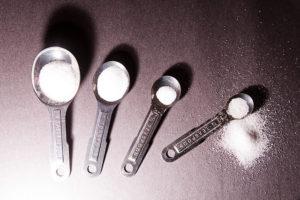 We know the FDA has its problems, from conflicts of interest to the stubborn refusal to acknowledge the science on mercury dental amalgam and finally put an end to the use of this antique dental material. But sometimes they do the right thing – like their recent decision to finally ban the use of artificial trans fats in food products.
We know the FDA has its problems, from conflicts of interest to the stubborn refusal to acknowledge the science on mercury dental amalgam and finally put an end to the use of this antique dental material. But sometimes they do the right thing – like their recent decision to finally ban the use of artificial trans fats in food products.
It didn’t take long for speculation to begin as to what ingredient might become “the next trans fat.” One obvious candidate: added sugars. As Georgetown pharmacology and physiology professor Thomas Sherman told Live Science,
I think that what trans fat does, in terms of increasing your blood pressure, increasing cholesterol, are the same kinds of things that sugar does…. Certainly, the levels at which people consume simple sugars is toxic.
Sounds like an echo of Dr. Robert Lustig, who maybe more than anyone else should be credited with bringing the problems of excess sugar consumption to mainstream attention. His 2012 commentary in Nature told the tale plain:
Authorities consider sugar as “empty calories” – but there is nothing empty about these calories. A growing body of scientific evidence is showing that fructose can trigger processes that lead to liver toxicity and a host of other chronic disease. A little is not a problem, but a lot kills – slowly…. If international bodies are truly concerned about public health, they must consider limiting fructose and its main delivery vehicles, the added sugars HFCS and sucrose – which pose dangers to individuals and society as a whole.
Unsurprisingly, more folks have been likening the sugar biz to the tobacco industry, whose playbook it appears to be following to a T.
Maybe we’ll see a push to tax sugary products like cigarettes. It’s hard to imagine an outright ban making it through. For one, industry wouldn’t go for it. A lot of people wouldn’t either – and not just because it strikes a lot of folks as too much “nanny state.” As we’ve discussed here before, we have a natural preference for sweet – and more ways to indulge it than ever before. Today, the average American eats over 100 pounds of sugar each year – about twice as much as our ancestors ate just a century ago.
Developing alternative sweeteners is another tactic for reducing consumption without losing all the sweet. These hyper-processed, manufactured sugar substitutes bring their own problems, of course. Even the best of the lot – stevia – is commonly processed in ways that compromise the goodness of the natural plant.
Just recently, we heard about a new product that’s claimed to provide all the sweetness and “energy” of sugar without all the calories. (Considering that a calorie is a unit of energy, we can only assume that they mean the sugar high, not actual energy.) It still uses sugar – just less of the stuff by delivering it in a novel way:
The gustatory system, through which the body perceives taste, is not a fully efficient process. When consuming food or drink with a sweet flavor, usually containing sugar syrup or powder, many of the sugar molecules move through the mouth and miss the sweet taste receptors.
Consumers ingest these sugar particles without registering their sweetness, and therefore the sweetness of the product as a whole. If people could taste every sugar molecule in a cup of regular soda, they would most likely find it inedible.
DouxMatok’s technology coats the sugar molecules on to organic carriers using a natural mineral, which transports multiple sugar molecules together to the taste receptors on the tongue.
FoodNavigator reported that “while there were some textural differences” in the products they were invited to sample, “the sweetness was the same,” despite containing about half as much sugar as in conventional preparations.
Sounds good, no? But then you have to wonder: If this method is embraced by industry and used widely, would we eventually see something like the Snackwell effect? A “less sugar, all the sweet” marketing claim is perfect for giving oneself permission to indulge more.
The smarter thing remains to forego added sugars all together – or, if you really want sweet, to use natural, unrefined sweeteners in moderation. (In fact, raw, local honey offers some potential health benefits.) In fact, if this were the only dietary change you made – eliminating added, refined sugars – you’d likely go a long way toward a healthier life.
Perhaps the bottom-line question is this: Which will be more satisfying – the few moments of sugar rush or a lifetime of good health? Which is worth more to you?
Image by Mick O, via Flickr